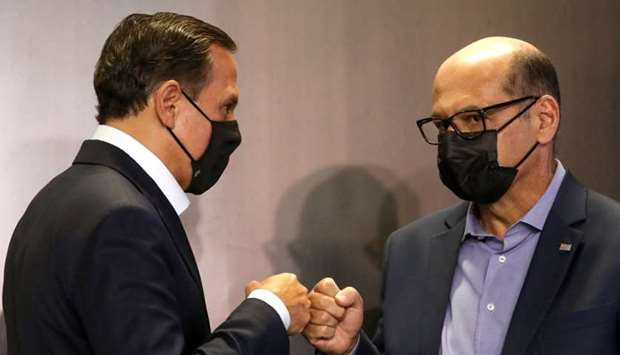Brazil's health regulator has suspended a clinical trial for China's Sinovac coronavirus vaccine citing a severe adverse event, surprising the trial organisers who countered there had been a death but it was unrelated to the vaccine.
The health regulator, Anvisa, said on Monday the event occurred on Oct. 29 but did not specify if it took place in Brazil or in another country. It also did not give an indication of how long the suspension might last.The trial is one of three large late-stage trials underway for the Sinovac vaccine. The vaccine has, however, faced controversy in Brazil with President Jair Bolsonaro dismissing it as lacking credibility.
The setback to Sinovac's efforts contrasts with good news from Pfizer Inc which said its experimental Covid-19 vaccine is more than 90% effective based on initial trial results.
Dimas Covas, the head of Sao Paulo's medical research institute Butantan which is conducting the Sinovac trial, said the regulator's decision was related to a death but added he found it strange "because it's a death unrelated to the vaccine."
"As there are more than 10,000 volunteers at this moment, deaths can occur... It's a death that has no relation with the vaccine and as such it is not the moment to interrupt the trials," Covas told local broadcaster TV Cultura.
Butantan plans to hold a news conference on Tuesday at 11 a.m. local time (1400 GMT).
Sinovac said in a statement on its website on Tuesday it was confident in the safety of its vaccine and will continue to communicate with Brazil on the matter. It has previously said it expects interim results of late-stage trials this year.
It is not uncommon for clinical trials to be suspended temporarily - sometimes for as short as a week - after a volunteer dies or takes ill so that trial organisers can check whether it is related to the drug being tested.
Sinovac's vaccine is among the three experimental Covid-19 vaccines that China has been using to inoculate hundreds of thousands of people under an emergency use programme. A Chinese health official said on Oct. 20 that serious side effects have not been observed in clinical trials.
The Sinovac vaccine has, however, been dismissed by Bolsonaro, who regularly expresses anti-Chinese sentiment and has previously said the federal government will not buy the vaccine.
Earlier on Monday he appeared to row back on those comments, saying the government would buy any vaccines that were approved by the Health Ministry and regulator Anvisa.
Even so, Bolsonaro's stance has set a clear political battleline with the Governor of Sao Paulo, Joao Doria, who has said his state will both import the vaccine and produce it, with work having begun on a plant capable of producing 100 million doses a year.
Doria, who is widely expected to challenge Bolsonaro at the next presidential election in 2022, has said a public inoculation program in Sao Paulo with the Sinovac vaccine would likely be rolled out as early as January.
Sinovac is also hoping to supply its experimental coronavirus vaccine to more South American countries by outsourcing some manufacturing procedures to Butantan.
Late stage trials are also being conducted in Indonesia and Turkey. Indonesia's state-owned Bio Farma said on Tuesday that its Sinovac vaccine trials were "going smoothly".
Brazil has the second deadliest coronavirus outbreak outside the United States, with over 160,000 dead and more than 5.6 million confirmed cases.
Four vaccines are being tested in Brazil seeking Anvisa approval, including those developed by Oxford University/AstraZeneca Plc and Johnson & Johnson's pharmaceutical subsidiary Janssen.
Pfizer's vaccine, developed in partnership with BioNTech SE , is undergoing late-stage tests involving 3,100 volunteers in Sao Paulo and Bahia states.
Worldwide, there are at least 10 vaccine candidates in late-stage clinical trials, according to the World Health Organization. Four of them are from China.

